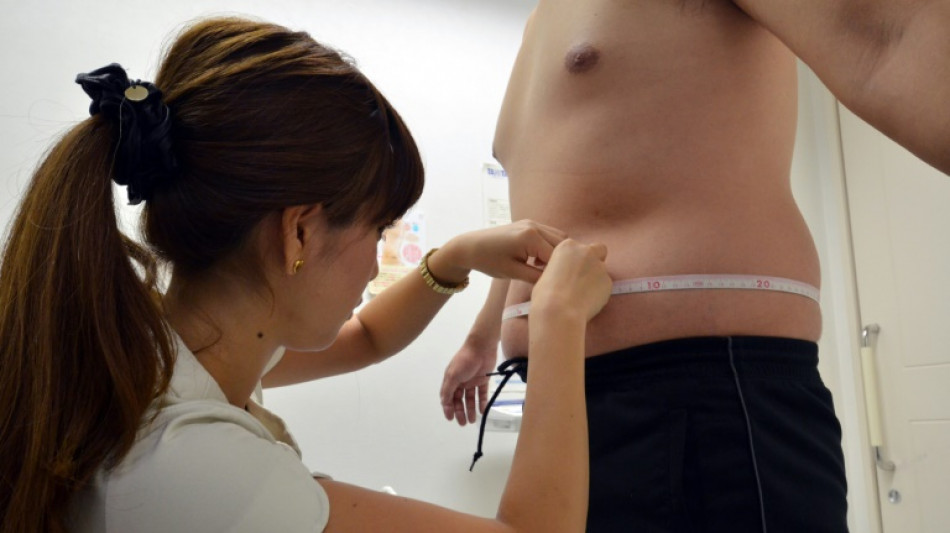
-
 Trump takes Christmas Eve shot at 'radical left scum'
Trump takes Christmas Eve shot at 'radical left scum'
-
Leo XIV celebrates first Christmas as pope

-
 Diallo and Mahrez strike at AFCON as Ivory Coast, Algeria win
Diallo and Mahrez strike at AFCON as Ivory Coast, Algeria win
-
'At your service!' Nasry Asfura becomes Honduran president-elect
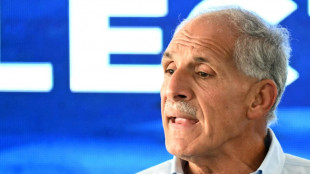
-
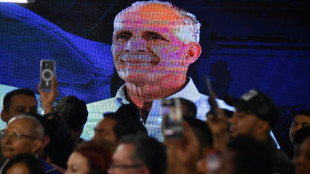 Trump-backed Nasry Asfura declared winner of Honduras presidency
Trump-backed Nasry Asfura declared winner of Honduras presidency
-
Diallo strikes to give AFCON holders Ivory Coast winning start

-
 Spurs captain Romero facing increased ban after Liverpool red card
Spurs captain Romero facing increased ban after Liverpool red card
-
Bolivian miners protest elimination of fuel subsidies

-
 A lack of respect? African football bows to pressure with AFCON change
A lack of respect? African football bows to pressure with AFCON change
-
Trump says comedian Colbert should be 'put to sleep'

-
 Mahrez leads Algeria to AFCON cruise against Sudan
Mahrez leads Algeria to AFCON cruise against Sudan
-
Southern California braces for devastating Christmas storm

-
 Amorim wants Man Utd players to cover 'irreplaceable' Fernandes
Amorim wants Man Utd players to cover 'irreplaceable' Fernandes
-
First Bond game in a decade hit by two-month delay

-
 Brazil's imprisoned Bolsonaro hospitalized ahead of surgery
Brazil's imprisoned Bolsonaro hospitalized ahead of surgery
-
Serbia court drops case against ex-minister over train station disaster
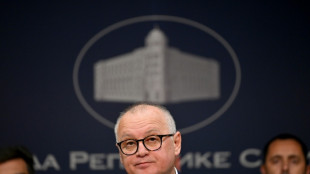
-
 Investors watching for Santa rally in thin pre-Christmas trade
Investors watching for Santa rally in thin pre-Christmas trade
-
David Sacks: Trump's AI power broker
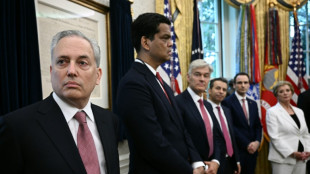
-
 Delap and Estevao in line for Chelsea return against Aston Villa
Delap and Estevao in line for Chelsea return against Aston Villa
-
Why metal prices are soaring to record highs

-
 Stocks tepid in thin pre-Christmas trade
Stocks tepid in thin pre-Christmas trade
-
UN experts slam US blockade on Venezuela

-
 Bethlehem celebrates first festive Christmas since Gaza war
Bethlehem celebrates first festive Christmas since Gaza war
-
Set-piece weakness costing Liverpool dear, says Slot

-
 Two police killed in explosion in Moscow
Two police killed in explosion in Moscow
-
EU 'strongly condemns' US sanctions against five Europeans

-
 Arsenal's Kepa Arrizabalaga eager for more League Cup heroics against Che;sea
Arsenal's Kepa Arrizabalaga eager for more League Cup heroics against Che;sea
-
Thailand-Cambodia border talks proceed after venue row

-
 Kosovo, Serbia 'need to normalise' relations: Kosovo PM to AFP
Kosovo, Serbia 'need to normalise' relations: Kosovo PM to AFP
-
Newcastle boss Howe takes no comfort from recent Man Utd record

-
 Frank warns squad to be 'grown-up' as Spurs players get Christmas Day off
Frank warns squad to be 'grown-up' as Spurs players get Christmas Day off
-
Rome pushes Meta to allow other AIs on WhatsApp

-
 Black box recovered from Libyan general's crashed plane
Black box recovered from Libyan general's crashed plane
-
Festive lights, security tight for Christmas in Damascus

-
 Zelensky reveals US-Ukraine plan to end Russian war, key questions remain
Zelensky reveals US-Ukraine plan to end Russian war, key questions remain
-
El Salvador defends mega-prison key to Trump deportations

-
 Stranger Things set for final bow: five things to know
Stranger Things set for final bow: five things to know
-
Grief, trauma weigh on survivors of catastrophic Hong Kong fire
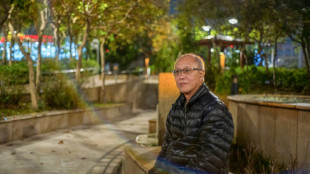
-
 Asian markets mixed after US growth data fuels Wall St record
Asian markets mixed after US growth data fuels Wall St record
-
Stokes says England player welfare his main priority

-
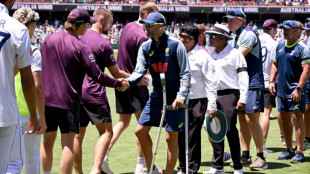 Australia's Lyon determined to bounce back after surgery
Australia's Lyon determined to bounce back after surgery
-
Stokes says England players' welfare his main priority

-
 North Korean POWs in Ukraine seeking 'new life' in South
North Korean POWs in Ukraine seeking 'new life' in South
-
Japanese golf star 'Jumbo' Ozaki dies aged 78

-
 Johnson, Castle shine as Spurs rout Thunder
Johnson, Castle shine as Spurs rout Thunder
-
Thai border clashes hit tourism at Cambodia's Angkor temples

-
 From predator to plate: Japan bear crisis sparks culinary craze
From predator to plate: Japan bear crisis sparks culinary craze
-
Asian markets mostly up after US growth fuels Wall St record

-
 'Happy milestone': Pakistan's historic brewery cheers export licence
'Happy milestone': Pakistan's historic brewery cheers export licence
-
Chevron: the only foreign oil company left in Venezuela


Is obesity a disease? Sometimes but not always, experts decide
Do people with obesity have an illness? A panel of global health experts looking at this controversial question announced Wednesday that the definition of obesity should be split into two categories -- and diagnosed using more accurate measurements.
The recommendations hoped to move past the blame and discrimination that often revolve around obesity, which is estimated to affect more than a billion people worldwide.
"The idea of obesity as a disease is at the centre of one of the most controversial and polarising debates in modern medicine," said a paper by the 56-expert commission in the Lancet Diabetes & Endocrinology journal.
On one hand, obesity is known to lead to an increased risk of Type 2 diabetes, heart disease, some cancers and other health problems. This is why the World Health Organization among others consider it to be a "chronic complex disease".
On the other hand, there are also plenty of people defined as obese who have few or no underlying health problems and lead active, healthy lives. Activists campaigning against fat shaming, for example, do not want people with obesity to automatically be considered unwell.
At the same time, some patients and doctors believe obesity needs to be considered a disease so that it receives the attention -- and ambitious policy -- required for such a major public health issue.
Francesco Rubino, a bariatric surgeon and professor at King's College London who chaired the expert commission, told a press conference that the "controversy derives from the fact that perhaps not everybody is entirely right and not everybody is entirely wrong".
- Introducing 'clinical obesity' -
After years of debate, the commission sought a middle road, introducing two new categories for people with obesity.
When obesity affects the functions of people's organs, it should be considered a distinct illness called "clinical obesity," the commission said.
The criteria for diagnosing clinical obesity included heart, liver or breathing problems, high cholesterol, sleep apnoea, hip, knee or feet pain or other problems that affect people's daily lives.
People with obesity who do not have such problems should be considered to have "pre-clinical obesity", which merits monitoring but not medical intervention, therefore avoiding the risk of "overdiagnosis", the commission said.
To diagnose obesity in the first place, the experts also recommended healthcare workers move beyond body mass index (BMI), which measures the ratio between weight and height and is widely considered inadequate.
They urged other measurements including waist circumference, waist-to-hip ratio or even bone density scans to get a more accurate diagnosis.
The experts emphasised that more research was needed to find out what percentage of people fell into their two new categories.
They also made no recommendations about the new generation of weight loss drugs such as Wegovy that have exploded in popularity since the commission was formed.
- Not everyone convinced -
Some researchers not involved in the commission welcomed the recommendations.
Tom Sanders, professor emeritus of nutrition and dietetics at King's College London, said that an official recognition of clinical obesity "would hopefully persuade lawmakers to regard it as a disability".
"This would have implications in terms of discrimination particularly in employment as well as the social stigma associated with the condition," he added.
While the nuanced recommendations aimed for consensus, they also risked satisfying neither side of the long-running debate.
Some groups that represent patients did not want to hear that obesity is not always a disease.
Anne-Sophie Joly, founder of France's National Collective of Obese Associations, called the recommendations "counterproductive", telling AFP the experts were disconnected from the "reality on the ground" in which patients with obesity do not receive adequate care.
Sceptics that obesity is ever a disease were also not satisfied.
Sylvie Benkemoun, a psychologist who leads France's Reflection Group on Obesity and being Overweight, told AFP the recommendations were "not enough, even if they have the merit of starting a discussion".
She expressed concern that the experts said little about the care given to patients with obesity -- and that the recommendations were unlikely to change much about the attitude of caregivers.
Y.Aukaiv--AMWN


